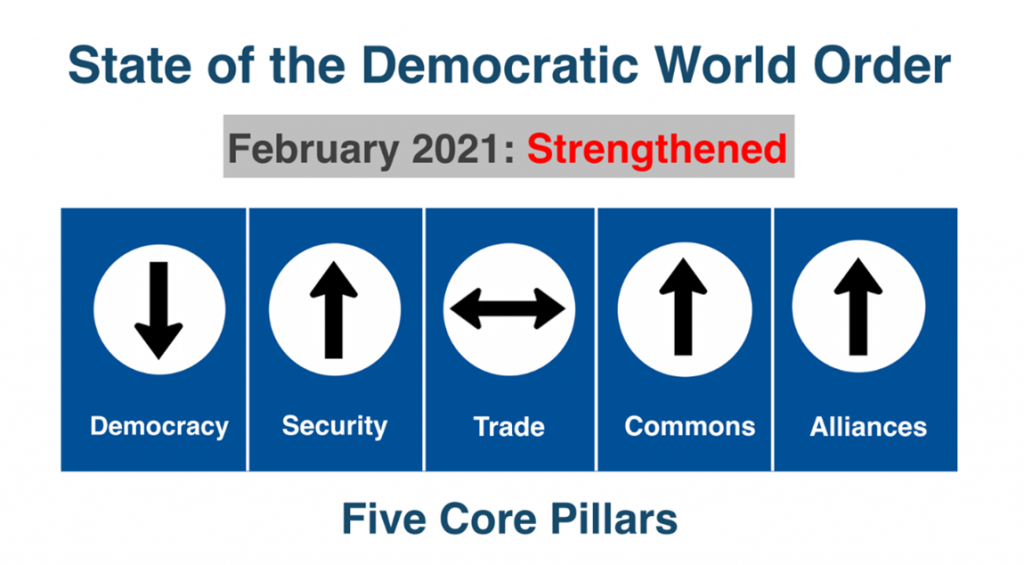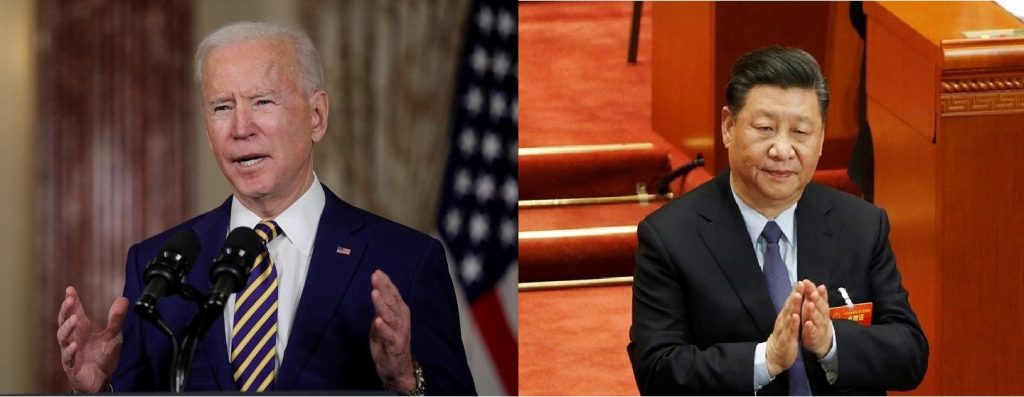Reshaping the order
This month’s topline events
Biden Prioritizes China. In his first foreign policy speech as president, Joe Biden made clear his administration views the challenge of China as among its highest national security priorities. Biden vowed to “confront China’s economic abuses, counter its aggressive, coercive action, [and] push back on China’s attack on human rights, intellectual property and global governance.” He later called on the US and its democratic allies to prepare for a “long-term strategic competition” with Beijing, declaring that the world was at an inflection point between autocracy and democracy.
- Shaping the Order. Biden’s remarks indicate that the United States is likely to intensify the strong stance toward China initiated by the Trump administration, and suggest we may be heading toward a more protracted, longer-term struggle between China and the free world.
- Hitting Home. Ongoing competition with China could require US businesses to redirect supply chains away from China in order to reduce strategic dependencies.
- What to Do. The Biden administration has adopted a clear-eyed view of the China challenge. It should follow by developing a coordinated strategy with allies and partners that focuses on strengthening ourselves at home and defending against China’s actions to undermine international norms, while also engaging Beijing on issues where cooperation appears feasible.
Vaccine Race Ramps Up. Distribution of coronavirus vaccines accelerated across the United States and around the world, as the Biden administration authorized a third vaccine and pledged $4 billion to GAVI to distribute vaccines to developing countries, reversing a Trump era policy. Meanwhile, Russia and China teamed up to expand distribution of their own vaccines, with Moscow touting a British medical journal report finding that its Sputnik V vaccine is highly effective and Beijing committing to provide nearly 500 million doses of its Sinopharm vaccine to more than 60 countries worldwide.
- Shaping the Order. The surge in vaccine production could hasten the end of the pandemic and spur a global economic rebound. But with the United States and Europe prioritizing distribution at home, Russia and China are using vaccine diplomacy to try to outcompete the United States and its allies and boost their soft power influence in countries across Asia, Latin America and Africa.
- Hitting Home. The United States is making great strides in vaccine distribution at home, with top health officials predicting that all Americans should have access to the vaccine by May.
- What to Do. The Biden administration should build on its progress to expand access to vaccines at home, while working with allies and partners, including through GAVI and the Indo-Pacific Quad, to accelerate distribution to the developing world. Washington should encourage coordination with Russia and China if their vaccines are truly proven effective, but also investigate reports that the two countries engaged in cyber espionage against Western pharmaceutical companies to hasten their vaccine efforts.
US Strikes Iran-Backed Militias. President Biden authorized military air strikes against Iran-backed militias operating in Syria, the first use of force in his nascent presidency, killing several militants responsible for recent attacks against American and allied personnel in Iraq. The strikes come on the heels of Biden’s appointment of a special envoy to begin talks on reentering the Iran nuclear agreement.
- Shaping the Order. The calibrated attack against the militias makes clear that the Biden administration is prepared to use force to defend American interests, even if that could complicate efforts to revive the 2015 Iran nuclear agreement – a message of resolve likely intended for other US rivals as well.
- Hitting Home. The attacks could serve to deter future Iranian attacks, but might also trigger retaliation against US troops serving in Iraq or terrorist attacks against other American targets.
- What to Do. Washington should continue to pressure Tehran to cease its support for militia and terrorist groups and be prepared to engage in additional strikes if Iran-backed militias target US troops in Iraq again.
We are in the midst of a fundamental debate about the future and direction of our world. We’re at an inflection point between those who argue that, given all the challenges we face – from the fourth industrial revolution to a global pandemic – that autocracy is the best way forward, they argue, and those who understand that democracy is essential to meeting those challenges.
– US President Joe Biden

State of the Order this month: Strengthened
Assessing the five core pillars of the democratic world order
Democracy (↓)
- Indian authorities arrested and charged a climate activist with sedition after her involvement in Greta Thunberg’s efforts to support India’s farmer protests – a move denounced by Freedom House and others as anti-democratic.
- Myanmar’s ruling junta maintained its grip on power, despite a general strike and the largest pro-democracy protest since the military coup earlier in the month.
- Despite calls to the contrary by pro-democracy advocates, the Biden administration decided not to sanction the Saudi royal family after a US intelligence report found that Crown Prince Mohammed bin Salman ordered the killing of Saudi author and dissident Jamal Khashoggi, though the administration did impose visa restrictions – dubbed “Khashoggi Bans” — against several other Saudis involved.
- Overall, the democracy pillar was weakened.
Security (↑)
- The Biden administration’s military strike against Iran-backed militias in Syria could serve as a deterrent against future attacks on US troops, while risking possible retaliation.
- Biden announced an end to US support for Saudi Arabia’s offensive military operations in Yemen and appointed a special envoy to revive dormant peace talks.
- Overall, the security pillar was strengthened.
Trade (↔)
- Nigerian Ngozi Okonjo-Iweala took the reins of the World Trade Organization, after the Biden administration reversed Trump’s veto of her appointment – a move that could help advance reforms aimed at bolstering the organization’s pro-free trade agenda.
- Biden reinstated a ten percent duty on aluminum imports from the United Arab Emirates, a move criticized by US businesses that had hoped the Biden administration would remove all Trump era tariffs on steel and aluminum.
- Overall, the global trade pillar remained unchanged.
Commons (↑)
- With vaccine distribution surging, daily cases of and deaths due to COVID-19 fell across the United States and most of the world, suggesting the worst of the pandemic may have passed, though many nations still face difficult days ahead.
- A US warship transited the Taiwan Strait in early February, the first since Biden took office, signaling that freedom of navigation operations will be a priority for the new administration.
- Overall, the global commons pillar was strengthened.
Alliances (↑)
- Biden joined G7 leaders at a virtual summit to discuss the coronavirus pandemic, a welcome sign for allies after Trump cancelled the G7 summit last summer. The summit preceded Biden’s address to the Munich Security Conference, where he renewed America’s commitment to transatlantic cooperation.
- Secretary of State Tony Blinken joined foreign ministers from Australia, Japan, and India in a virtual meeting of the Indo-Pacific Quad. Blinken also joined with European foreign ministers participating in a virtual meeting with the EU Foreign Affairs Council.
- President Joe Biden held the first bilateral meeting of his presidency, welcoming Canadian Prime Minister Justin Trudeau in a virtual setting – a meeting described as “warm” and positive.
- Overall, the alliances pillar was strengthened.
Strengthened (↑)________Unchanged (↔)________Weakened (↓)
What is the democratic world order? Also known as the liberal order, the rules-based order, or simply the free world, the democratic world order encompasses the rules, norms, alliances, and institutions created and supported by leading democracies over the past seven decades to foster security, democracy, prosperity, and a healthy planet.
This month’s top reads
Three must-read commentaries on the democratic order
- Robert Kagan asserts in Foreign Affairs that Biden needs to be up front with the American people on America’s responsibility to lead the world order.
- Danielle Lupton, writing in Foreign Affairs, contends that the new administration needs to move fast to repair American credibility on the world stage, by renewing a commitment to its relationships, its values, and the international institutions it helped to build.
- In a new report for Brookings, William Burke-White sets forth a comprehensive roadmap for renewing US multilateral engagement, starting with countries that share US values and a commitment to democracy.
Action and analysis by the Atlantic Council
Our experts weigh in on this month’s events
- Fred Kempe, writing for CNBC, argues that in the wake of the challenge from China, Biden will need to develop a far more creative, intensive, and collaborative approach to America’s Asian and European allies than perhaps ever before.
- Kirsten Fontenrose, in the New Atlanticist, contends that the Biden administration should find ways to admonish the parties in Saudi Arabia responsible for Khashoggi’s death without making the United States the object of retribution.
- In an Atlantic Council issue brief, Matt Kroenig and Mark Massa propose options for including China in an arms control agreement based on the New START Treaty.
- Dan Fried and Eddie Fishman, in the New Atlanticist, recommend options for structuring the State Department’s new Office of Sanctions Coordination.
NOTE: The Atlantic Council Millennium Fellowship is now accepting applications. This is a one-of-a-kind leadership “accelerator” open to rising leaders around the world (ages 25-35) committed to achieving transformational change in their communities, countries, and professional fields with a global impact to tackle the defining challenges of their generation. The application deadline in March 31.
__________________________________________________
The Democratic Order Initiative is an Atlantic Council initiative aimed at reenergizing American global leadership and strengthening cooperation among the world’s democracies in support of a rules-based democratic order. Sign on to the Council’s Declaration of Principles for Freedom, Prosperity, and Peace by clicking here.
Ash Jain – Senior Fellow
Dan Fried – Distinguished Fellow
Jeffrey Cimmino – Assistant Director
Joel Kesselbrenner – Young Global Professionals Intern
Paul Cormarie – Georgetown Student Researcher
If you would like to be added to our email list for future publications and events, or to learn more about the Democratic Order Initiative, please email AJain@atlanticcouncil.org.
